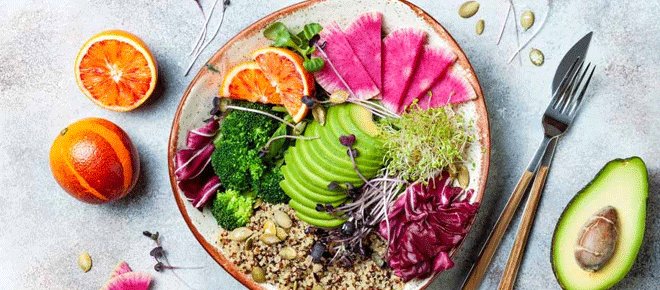7 Foods That Boost Brain Power and Improve Memory

Whether you're studying for that big exam or just working through a long week, these brain-boosting foods are here to help.
Berries, for one, are chock full of flavonoids, which can boost blood flow to the brain. They're also packed with antioxidants, which are known to prevent age-related memory decline.
Blueberries
Blueberries are a superfood that’s gaining popularity for their benefits to brain health. These berries are high in antioxidants and anti-inflammatory compounds that can improve communication between brain cells. If you want to best quality food then check out the Be Fit Food Coupon Code.
These antioxidants can help keep other health conditions from affecting the brain, which can prevent memory loss and cognitive decline. Moreover, blueberries can help increase blood flow to the grey-matter areas of the brain.
Researchers recently conducted a study that found that daily consumption of blueberries for 12 weeks improved learning and memory in older adults. Interestingly, this was one of the first studies to connect these results to specific changes in brain function and blood flow.
In addition, the research found that people who consumed blueberries also showed improvements in artery function, including reduced stiffness and improved cholesterol profiles. This resulted in reduced heart disease risk for the participants, per the National Library of Medicine.
While these findings are encouraging, further human trials must be done to amplify the effects of the studies and confirm this hypothesis. The small sample size of this trial and the lack of a fully matched control product may limit the validity of this research, but these preliminary findings provide an initial basis for further human research on blueberry supplementation as a possible preventive intervention to cognitive aging.
Dark Chocolate
Dark chocolate is a great source of antioxidants and flavonols, which are plant compounds that boost your mood and improve your memory. In particular, the flavonol epicatechin helps prevent the immune system from going into overdrive and reduces oxidative stress.
A study from Loma Linda University Health in California revealed that eating dark chocolate changes your brain wave frequency, which can lead to better memory and reduced stress. It also increases blood flow to the brain, lowering your risk of heart disease.
According to researchers, this is because chocolate activates a type of brain wave known as gamma frequency. These are associated with the highest levels of memory and information processing.
However, consuming too much chocolate can cause weight gain and inhibit your desire to eat more healthy foods. Therefore, it’s important to stick to small serving sizes, averaging between one and two ounces per day.
To get the most benefits, choose the darkest chocolate you can, preferably 70 percent cocoa. You can also try the Foods and Drinks Promo Code, which is less processed than chocolate bars and contain no added sugar.
Avocados
Avocados are a nutrient-dense, high-fat fruit that can help improve brain power and memory. They are packed with a wide range of antioxidants, vitamin E, and lutein.
They also contain B vitamins, which have been linked to improved cognitive function. They can help prevent the development of Alzheimer’s disease and slow cognitive decline in older adults (45).
A recent study published in the journal Neurology showed that avocado consumption was associated with better memory performance among healthy adults over 50. Those who consumed the fruits performed better on cognitive tests such as the CERAD Independent and Dependent Wrist Rotation Test and the Global Cognition Score.
These benefits come from the fats in avocados, which are primarily monounsaturated and polyunsaturated. These fats have been shown to lower inflammation, promote blood sugar stability, and support mental well-being.
The fruit is also a rich source of potassium, which helps control your blood pressure and ease tension in your blood vessels. It is also a good source of heart-healthy fatty acids, including oleic acid and alpha-linolenic acid. Both of these fatty acids have been shown to lower cholesterol levels. Additionally, avocados are a source of beta-sitosterol, which has been linked to improving cardiovascular health.
Olive Oil
One of the most important oils for your brain is olive oil, which is a rich source of antioxidants and monounsaturated fats (MUFAs). These healthy fats help protect your memory and reduce the risk of Alzheimer’s disease.
The MUFAs in olive oil also support your brain's health by improving neurotransmitter function and reducing inflammation. In addition, a Mediterranean diet that includes olive oil and nuts is linked with improved cognitive function in older people.
Moreover, the polyphenols in olive oil help regulate inflammation and protect your brain against damage from free radicals, which cause oxidation. This process is responsible for cell degeneration and the onset of conditions like depression and Alzheimer's disease.
According to a 2022 study published in Nutrients, adults with mild cognitive impairment (MCI) who consumed 30 mL of extra virgin olive oil daily for 6 months showed improvements in their memory and behavioral function. The researchers found that EVOO helped enhance the functioning of the blood-brain barrier (BBB) and reduced amyloid plaque accumulation in the brain.
To get the most out of your olive oil, make sure you choose a high-quality extra-virgin product. It's best to avoid refined or processed oil, which can rob you of the beneficial compounds.
Tomatoes
The brain is the most energy-intensive organ in the body, so it requires nutrients and fuel to perform at its best. The key is to get a wide variety of antioxidant-rich foods in your diet.
Tomatoes are rich in lycopene, which has been shown to protect the brain against free radical damage. Studies have also found that tomatoes can help prevent cognitive disorders such as Alzheimer’s disease and Parkinson’s disease.
Another benefit of tomatoes is that they contain chromium, which helps to regulate blood sugar and reduce your risk of diabetes. They’re also high in vitamin A, which can improve your vision and prevent night blindness, as well as lower your risk of macular degeneration.
They’re also a good source of potassium, which promotes lightning-fast brain signals between neurons and improves memory power. They’re also a great source of folate, which is known to slow cognitive decline and increase attention span.
Tomatoes are a popular ingredient in many curries and sauces, but you can also enjoy them raw. They’re a good source of antioxidants, including lycopene and beta-carotene, which can help protect your heart from the effects of inflammation. And they’re an excellent source of calcium, which is essential for bone health.
Whole Grains
Whole grains are healthy foods that are a great source of fiber, protein, and vitamins. These nutrients are contained in the three parts of a whole grain: bran, germ, and endosperm.
The bran is the outer layer of a grain that supplies healthy fiber, B vitamins, and antioxidants; the germ is the nutrient-rich core of the seed; and the endosperm is the starchy portion of a grain. When a grain is refined, such as when it's made into white flour or rice, the bran and germ are removed, and only the endosperm remains.
In addition to the many health benefits of eating whole grains, these foods are also low in sugar and have a lower glycemic index than refined carbohydrates. This means that they break down more slowly in your body, releasing their sugar gradually and allowing for more steady blood flow to the brain.
Eating a diet rich in whole grains and complex carbohydrates, like brown rice, quinoa, oatmeal, barley, wheat berries, and couscous, can help protect your brain from disease, improve memory, and boost your mood. This is because these complex carbs are slow to metabolize and provide the sustained supply of glucose your brain needs. They also contain folate, a memory-boosting B vitamin.
Red Cabbage
Red cabbage is packed with vitamin K and anthocyanins, which are antioxidants that boost brain power and help improve concentration. It also contains choline, a nutrient that helps promote memory and fight inflammation.
It is rich in soluble fiber, which helps increase satiety and reduce energy intake, thus promoting weight loss and dietary adherence when paired with a calorie-restricted diet. It also increases short-chain fatty acids in the gut (SCFAs), which feed the good bacteria in your digestive tract and lowers the risk of constipation.
In addition, the polyphenols and sulforaphane found in cabbage are known for their anti-inflammatory properties. This helps to prevent and treat cardiovascular diseases, like heart disease and stroke, as well as cancer.
Another benefit of eating cabbage is its ability to increase the levels of folic acid in your bloodstream. Folic acid is important for the production of serotonin, a neurotransmitter that regulates mood and behavior.
Cabbage is also a good source of sulfur, which your body needs to produce keratin, a protein that protects hair, skin, and nails. It also provides 35% of the daily recommended value of vitamin A, which is necessary for protecting your eyes from deterioration as you age.
Conclusion
Incorporating foods that are rich in omega-3 fatty acids, antioxidants, and other nutrients can help boost brain power and improve memory. Some of these foods include fatty fish, berries, nuts, seeds, leafy greens, whole grains, and dark chocolate. Adding these foods to your diet may help keep your brain healthy and functioning at its best.








